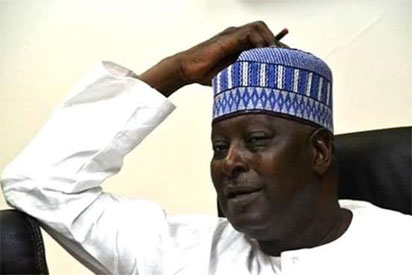Since the return of Democratic rule in 1999, successive governments have beat their chest to fight corruption, none as been vociferous and determined as the present administration, yet it has been plagued by corruption from within.
Babachir Lawal,62, a close associate of President Muhammadu Buhari was one of the very first few people to be appointed by the President. He was appointment to the exalted position of the Secretary to the Federal Government (SGF).
As many in the northeast faced starvation and hunger resulting from Book Haram insurgency, the government spurned into action by deciding to spend $1.4m to cut down weeds around the village of Wachakal in order to stop flooding.
Few months later, $1.04m had been transferred from the company hired to do the job to a firm founded by Mr. Lawal according to a Senate report. In the report, the Senate concluded that companies that received contracts for projects including the weeding from a government body overseen by the official, Babachir Lawal
, transferred a total of 500 million naira ($2.2 million) to the firm he set up.
The Senate shouted to high heavens accusing the executive of corruption, calling publicly for a criminal investigation of the payment. The Senate committee said the scheme involved inflating the value of contracts to enrich Lawal and his associates.
In a written statement responding to Reuters’ questions, Lawal denied wrongdoing and said he had been the victim of a Senate witch-hunt.
A Reuters review of the Senate report’s findings shows how two pillars of Buhari’s presidency – restoring stability in the northeast and fighting corruption – may have been undermined by the alleged misappropriation of aid money and food.
The review draws upon documents detailing bank transfers and corporate records, visits to aid projects and interviews with senior politicians, diplomats and humanitarian workers.
The Senate report recommended that Lawal be prosecuted for allegedly flouting procurement rules and breaking his oaths of office.
As so much dilly dallying, President Buhari suspended Lawal in April and set up 3-man committee head by Vice President Yemi Osinbajo to investigate the matter. The committee submitted it’s report on August 22 to the President.
In spite of this administration’s anti corruption posture, no no major figures have been convicted so far. All prosecutions and convictions are done on the front pages of the newspapers.
Sen. Shehu Sani, who chaired the Senate committee that produced the report, said overall losses to suspected corruption in various forms in the northeastern humanitarian crisis in recent years had not been determined due to the probe’s specific remit and factors that restricted its scope.
He said the Senate investigation was limited by the timeframe examined, as it focused on government aid spending since the current administration took office in May, 2015.
Sani also said some government agencies had refused to cooperate, access to bank account details was limited and the use of international donor funds was not investigated.
“We can say, conservatively, that over 10 billion naira ($33 million) of monies that were supposed to go to the IDPs (internally displaced persons) were misappropriated or unaccounted for, or misused from different segments of the Nigerian government,” Sani told Reuters.
According to a 2014 internal PINE presentation prepared by the then-chairman for the group’s committee, a pilot scheme sent 51 food trucks to Borno state and 10 to Gombe state; none arrived.
As the SGF, Lawal through PINE, oversaw millions of dollars of aid. The Senate report alleges that most aid contracts in 2016 did not help the needy. Instead, inflated contracts “were awarded to companies belonging to top government officials’ cronies and close associates”.
It said a company called Rholavision Engineering Limited, which describes itself as “Information and Communication Technology Engineers & Consultants” and was founded by Lawal in 1990, was where money for companies that were awarded contracts by PINE came to first.
In his statement, Lawal said he relinquished ties with Rholavision on Aug. 27, 2015, four days before being sworn in as SGF.
But company registry records show he did not resign as a director until Sept. 8, 2016. In addition, a signed letter from Lawal to the Corporate Affairs Commission (CAC) dated Sept. 16, 2016 – contained in the appendices of the Senate report – said he wished to relinquish his shares in Rholavision.
Ali Dodo, a farmer in Wachakal, told Reuters that he and others cut weeds around the Komadugu-Yobe river over a month-long period from August 2016. He said contractors paid them 2,500 naira a day.
President Buhari last October replaced PINE with the Presidential Committee on the Northeast Initiative.
Source: Reuters




